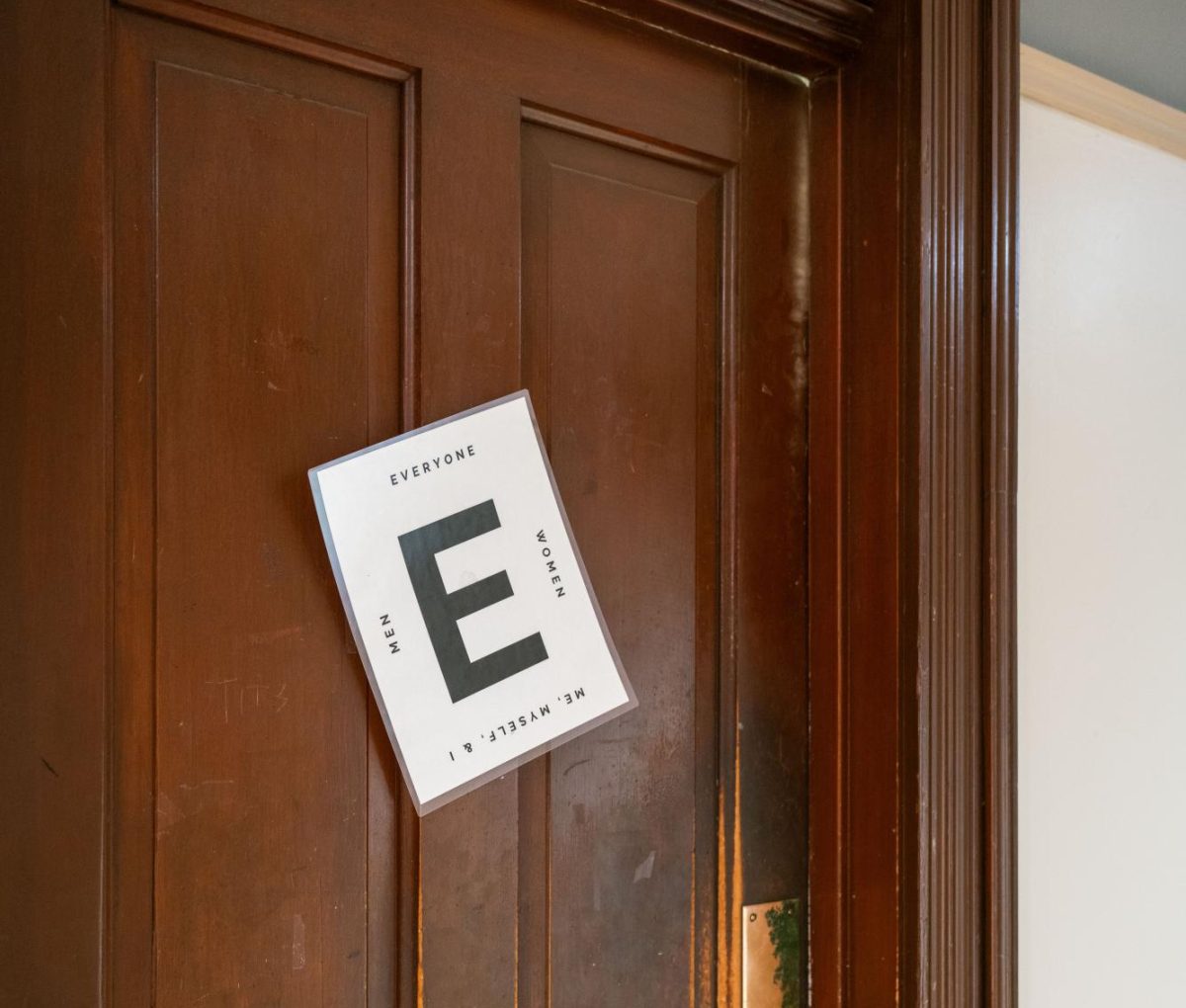At the end of November, Governor Mike DeWine signed Senate Bill 104 into law — which included House Bill 183 as an amendment — after it was passed by the Ohio state legislature. The bill will restrict the use of bathrooms by transgender students at all schools and universities in Ohio, including Oberlin College. The piece of legislation is one of many bills in the country, colloquially known as bathroom bills, that will restrict bathroom access for transgender students.
Vice President and Dean of Students Karen Goff spoke about the College’s path forward.
“Clearly we are going to adhere to the law,” Goff said, “But … we want to maintain our focus on supporting our students.”
The bill itself states that every institution of higher education must designate each multi-person restroom, locker room, and shower facility for use by people of the “male biological sex” or “female biological sex” only; must not “knowingly” permit a person to use such a facility not corresponding to their biological sex; and must not maintain such a multi-occupant facility as open to all genders. The act does not contain any explicit enforcement mechanism.
Last semester, in preparation for such legislation, the Oberlin administration established an LGBTQ+ legislative taskforce to anticipate the changes a bathroom bill would mandate. Now that such a bill has been passed, the material requirements for Oberlin to comply with the law while supporting trans students are being defined.
So far, Goff and Assistant Vice President and Dean of Intercultural Engagement Kyle Williams confirmed that the College will be re-adjudicating and putting up signs for male and female restrooms while also working to make all single-occupancy bathrooms all-gender, which will be in line with the law’s mandates on multi-person facilities. Other implications and paths forward in line with the law are still under examination by the LGBTQ+ legislative taskforce and other Oberlin legal representatives.
Oberlin is also in contact with other universities and colleges impacted by such legislation — within Ohio and in other states across the country, including Tennessee and Florida, with similar bills. The Oberlin administration says it will continue work on and reemphasize support for trans students.
“We can’t control what the Ohio legislature does, — like I said, we will have to adhere to the law — but where we do have control is making sure that the impact on our students is not overwhelming and that they still have access to the care and access to the offices that provide for them,” Goff said.
The passage of the bill has raised concerns among many of Oberlin’s transgender students. College second-year Ajax Loeven, the treasurer for LILAC, an organization advocating for and facilitating community for Oberlin’s transgender students, spoke about students’ feelings at this time.
“The conversation is obviously really heavy,” Loeven said. “There’s a lot of grief, honestly, around the bills. The number one thing I see popping up in the conversations we have is what the school will do in response.”
In a statement following the bill’s passage, Jocelyn Rosnick, policy director for the American Civil Liberties Union of Ohio, condemned the Senate’s decision. Oberlin has been interacting with Rosnick in its initiatives to interpret the law.
“[The bill] will create unsafe environments for trans and gender non-confirming individuals of all ages,” Rosnick said. “This bill ignores the material reality that transgender people endure higher rates of sexual violence and assaults, particularly while using public restrooms, than people who are not transgender. All Ohioans deserve to access the facilities they need, in alignment with their gender identity, without fear of harassment or bullying.”
Neptune Rasnic Olson, a transgender College second-year, also spoke about the possibility of having to leave Oberlin in response to feeling unsafe in Ohio.
“There’s a world in which I leave this school because of this, and I know that it’s true for a lot of other people,” Rasnic Olson said. “I don’t want to. [I knew] where it is, [I knew] that [I’m] coming to Ohio. But part of me was holding out hope that things would remain stable here. But I can only be pushed so far, and because I can leave, because I could go somewhere else, I might.”
Williams emphasized that, while the law interferes with individual trans students’ lives, it does not restrict their right to safety or rescind protections offered by organizations such as Title IX on campus.
“If our students are finding spaces where they are unsafe, I encourage them to engage with the [Center for Intercultural Engagement], where we can have those conversations about what is occurring,” Williams said. “If something is not safe we are protecting them as citizens of our country, as individuals on our campus.”
Williams and Goff said that NiK Peavy, director of The Office of Gender & Attraction Initiatives in the Multicultural Resource Commons, was interfacing with TransOhio and Colors+, two organizations that promote wellness for LGBTQ+ youth.
As a representative of LILAC, Loeven extended an invitation for all campus community members to attend a LILAC meeting to learn more about supporting the trans community interpersonally and engaging in advocacy.
Goff reaffirmed the College’s commitment to maintaining its culture around transgender rights.
“Oberlin has already been known as one of the safest places to be — I don’t think that will change,” Goff said. “As we look across the country and see what’s happening, if any place, I think, can be a safe haven, it should be Oberlin.”
In this period between the bill’s passage and its implementation, some students feel frustration with the administration for a lack of communication.
“The silence from the administration is very disheartening, and it’s making me feel as though they don’t really prioritize or care about trans students, staff, and faculty,” Rasnic Olson said. “A great first step is just any statement voicing their support — I want to know where they stand on it, I want to hear how they plan to support the trans Oberlin community right now.”
The deans affirmed that a statement from the administration should be coming soon. The bill will go into effect Feb. 25, 90 days after it was signed.










